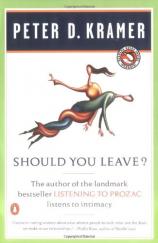Reading Group Guide
Discussion Questions
Should You Leave?

1."When I read a self-help precept," says Dr. Kramer, "invariably I think that the opposite advice might be equally apt, for someone." Has his concept of targeted advice, and multiple perspectives, made this book of value to you?
2. How have you found Should You Leave? different from typical self-help books on relationship problems? What insights have you gained from its unique approach?
3. Does its ambiguous use of second-person narrative clarify its message? How does that technique reflect the intimacy and tensions of relationships?
4. In illustrating some of his points, Dr. Kramer refers to Anna Karenina, King Lear, and the Bible. Do you agree that a response to fiction can be more useful than a list of precepts? What works of fiction have produced that sort of response in you?
5. Do you feel a clash between autonomy and connection? Are women really more connected than men? Was the psychiatrist Murray Bowen, as recounted in Should You Leave?, right to manipulate his family to achieve both?
6. Is connection just an avoidance of selfhood, as some say, or is America blinded by its ongoing romance with autonomy? How should we, in this day and age, rate the Emersonian ideal of auton-omy and the self-reliant individual? Or the "me first" revolution of the past decades? How has feminism balanced the tension between independence and attachment? How do you, or others you know, manage it -- or are the two mutually exclusive?
7. Is it possible to talk about things that are good for a relationship as opposed to what is good and bad for the people involved in it? Is a relationship an entity?
8. Dr. Kramer quotes the feminist Katha Pollitt's remark that "men are from Illinois and women are from Indiana," and adds: "They are different, but not in especially confusing ways...they are adapted to cope with one another." Do you agree? How much does gender matter; and what does the story of Connie in Should You Leave? tell us about it? Does "Lou" gain power and meaning from being genderless?
9. Which "patients" in the book do you identify with most? Why?
10. Dr. Kramer writes about the complexities, and different styles, of relationships between therapist and clients. What has been your experience of these?
11. In the story of Melanie, Dr. Kramer questions Martin Buber's position that "objective entitlement," or justice, exists within a relationship. What do you think?
12. Are you well-matched with your spouse? If not, why not? What is "matching"? What is growing together? Is either of you depressed; and how could this have a negative, or even a positive, effect on events?
13. Does Dr. Kramer's description of "re-entering the marriage" at a higher level of consciousness and detachment open the door to a spiritual evolution?
Should You Leave?
- Publication Date: January 1, 1999
- Paperback: 320 pages
- Publisher: Penguin (Non-Classics)
- ISBN-10: 0140272798
- ISBN-13: 9780140272796






